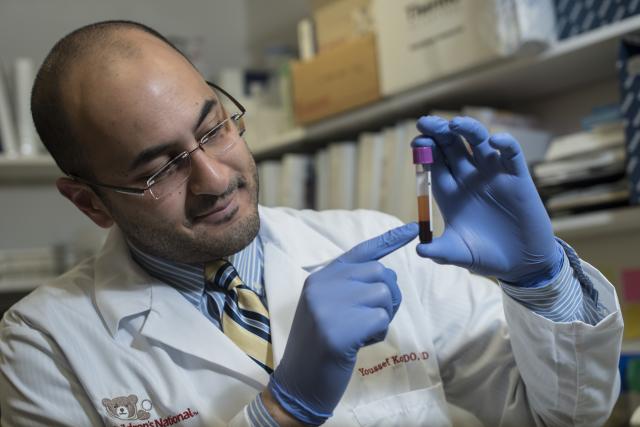Kean Alumnus Discovers Genetic Link Between Two Congenital Disorders

Kean alumnus Dr. Youssef A. Kousa ’05, ’07 M.S. has made a breakthrough genetic discovery.
A Kean alumnus has made a breakthrough discovery, identifying three genes that could be responsible for two previously unrelated types of congenital disorders — cleft lip and palate, and neural tube defects like spina bifida.
With time and further research, the finding by Dr. Youssef A. Kousa ’05, ’07 M.S. and his collaborators could lead to better prenatal testing for these genetic anomalies.
“It is a very important finding because typically we think of a gene causing a disease, but this discovery shows that a group of genes can cause two congenital birth defects,” he said. “Rather than trying to find more genes, we can now go back and think about the genes that we have already identified and see if these same genes are contributing to other birth defects as well.”
Kousa, now a Child Neurology Fellow at Children’s National Health System in Washington, D.C., remembers the “aha moment” nine years ago at Michigan State University, when studying the genetic component for cleft lip and palate in laboratory mice, he recognized the possible connection to neural tube defects. Kousa and research teams across the country then conducted thousands of experiments before proving the discovery.
“I remember thinking, ‘This is a game changer,’” he said. “I remember saying to myself, ‘This is completely unexpected; this is completely novel; this is completely new.’ We worked together with more and more people to identify what it was and have clarity about why this was happening.”
Kousa earned two degrees from Kean — a B.S. in biology in 2005 and an M.S. in biotechnology in 2007. He also has a medical degree and Ph.D. from Michigan State University. He is finishing his fellowship program at Children’s National, on his way to being a pediatric neurologist.
Kousa was 10 when he and his family emigrated from Egypt. He brought with him resilience and curiosity, traits that he says were fostered at Kean.
“There wasn’t a more perfect place for me than Kean,” said Kousa, who added that because of the diversity, strong work ethic and large number of first-generation students, he was able to seamlessly assimilate into his new environment as a college freshman.
“Kean students are phenomenal people because they understand the subtleties of life, and they have grit. They know what it means to try and try again. I am very thankful for everything that I received at Kean, all of the mentoring and guidance to feel that I could reach for bigger and better goals.”
Biological sciences Professor Xiaobo Yu, Ph.D., taught Anatomy and Physiology to Kousa and called him “one of the best and highly motivated students I have ever met” in the letter of recommendation he wrote for Kousa’s application to medical school.
“As I used to quote from the poet William Butler Yeats to my students, including Youssef, ‘Education is not filling up a bucket, but lighting up a fire.’ In Youssef, we succeeded in lighting the fire, and he kept the fire spreading,” said Yu. “Youssef's success certainly reflects this, and he is a source of pride for all of us.”
In the immediate future, Kousa will continue to work with a genetic consortium across the United States and South America trying to identify genes that are contributing to other types of congenital malformations, with an emphasis on the brain.
The 36-year-old father of three hopes to split his time between the lab and direct patient care when he completes his fellowship.
“My goal has always been to live a life where I feel like I have made a contribution. To me, there can be no greater contribution than to help people,” he said. “That means helping the patients I see, but also discovering something that improves our diagnostic and treatment plans for patients around the world. It’s a big goal, but I am willing to take risks and to try.”
WATCH: Dr. Yousseff Kousa ’05, ’07 M.S. talks about his breakthrough genetic discovery.